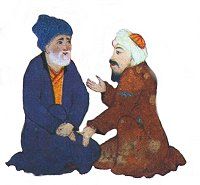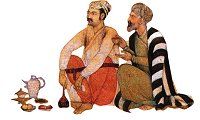Serving the Guest: A Sufi Cookbook
Essays | Recipes | Gallery

If anyone should come to his house, whether known or unknown to him, he used to come and meet him with a smiling face and to the utmost of his power he worked to make him welcome. He used to wait on guests with his own hands [...] Sometimes he used to be occupied with agriculture and he used to eat whatever he produced from his own land. Many of the Shaikhs who lived in those parts used to say "Let us go and call on Bahauddin today. We shall be sure of eating pure food."
When he was at meals he used to pay closest attention to the example of the Prophet. For the most part he used to prepare the meals with his own hands, and he himself used to lay the table. He used to begin a meal with invoking the Name of God and finish it with giving thanks. If he noticed during meals that anyone present was not conforming to the counsels of the Prophet, he would wake him up and gently draw his attention. People who behaved badly at meals were not allowed to eat with him. He would never eat nor allow his followers to eat a meal which was prepared carelessly or unwillingly or by a cook who was in a state of anger or disturbance. He used to say that meals of such a kind were poisoned. If a guest should come when he was fasting, he would bring that guest a meal before the time of breaking of the fast, and to make him feel at home he would even break his own fast and eat with him. In this regard he used to say "It is more blessed to make a guest or a companion feel at home by eating a meal with him than to keep an optional fast."
from Serving the Guest: A Sufi Cookbook
Copyright © 1999, 2000 by Kathleen Seidel
Sources of previously published material by other authors used by permission, and print sources for images, may be found at http://www.superluminal.com/cookbook.
